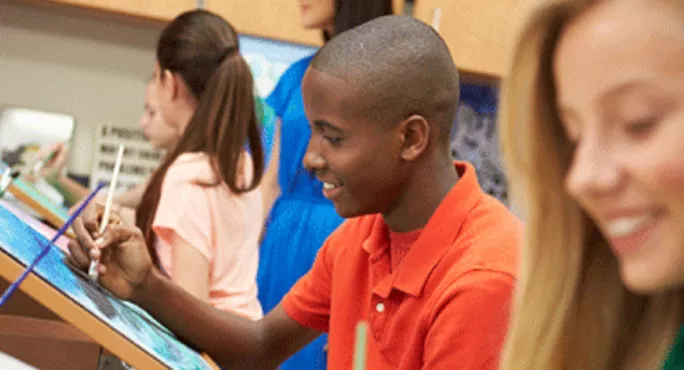Another week, another classroom, another continent. Two school visits in consecutive weeks left me inspired by the power of making, project-based learning, and work that engages pupils by rooting the learning in the real world. Neither involved mark books, progress measures or test scores.
First I was at Palo Alto High School in California, and on Friday I visited Southhill Primary in Weymouth, Dorset.
At Palo Alto, I visited the celebrated journalism class taught by Esther Wojcicki, called simply “Woj” by her pupils. Twenty per cent of pupils in the school choose this course in a great new facility that in recent years replaced a nasty temporary classroom.
Students were busy in a newsroom finishing the latest edition of their paper. Others showed me their sports magazine, their features magazine and their photojournalism publication. I popped into a film studies session that were watching Gene Kelly in Singin’ in the Rain.
Learning without textbooks
There was not a textbook in sight. Obviously no uniforms. There was little structure and a certain amount of wandering around. Some were timetabled to be there others there in their “study” periods. The teachers were very happy. I can think of schools ministers in the UK who might have hated it.
Jordan showed me round. He was timetabled about four hours a week for journalism but clearly also did a few hours more in his own time. He was editing their foreign affairs publication and recruited me to write an article; he had a photo on the front of the features magazine and he was on the editorial board of the newspaper. He didn’t spend as much time on the class as he may have liked because he was in the sports team. He was a leader.
All pupils were working. They were learning how to research, how to distill their findings into superb, well-presented writing or other media. They were communicators and team workers. I think the CBI would have loved it.
Clearly only a small number of the graduates from this high school class will become journalists but they were developing skills of great value at university or in the digital workplace.
Sustainability
The pupils at Southill Primary in Dorset a week later were a lot younger. They had invited me to see what they had been doing to learn about the UN’s Sustainable Development Goals.
Their teacher Sophie, the head Paul, and Jason the chair of governors, showed me round. Their work on the Global Goals was informed by their ongoing work with children’s charity Unicef as a Rights Respecting School. They had taken a day for the whole school to learn about the new goals.
The Reception children showed me their self-portraits on the wall as part of learning about diversity and the importance of being different. Year 1 had made cars out of old water bottles and straws, as part of learning about waste and recycling. Years 2 and 4 had covered hunger and used Fair Trade bananas and chocolate to learn about food and trade. Year 3 sang me a great song about water conservation and Year 5 showed me their maths work on religions. The finale was a tapestry of all the goals they had made and was in display in the school hall.
In every class they remembered the activity and mostly remembered the learning! They wanted more days to be like that.
The day before my visit to Southill I was in Sheffield for the Education Reform North summit (article free to subscribers) at Sheffield Hallam University. There I heard Sir Kevan Collins from the Education Endowment Fund. He lamented the trend that he saw too many teachers so tyrannised by the mark book that they were losing time to properly observe children learning.
My two school visits gave me hope that accountability was not yet completely stifling great teaching and learning. In some cases marking was not winning over teaching. But the visits also showed what more we could do by embracing making and creativity - activity that is harder to measure. The challenge for policymakers is to find the right balance in the school system accountability to allow that to happen.
Jim Knight is chief education adviser to TES Global, parent company of TES, and a former schools minister. He tweets at @jimpknight
Want to keep up with the latest education news and opinion? Follow TES on Twitter and like TES on Facebook




